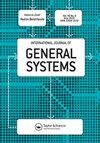Preface of the special issue on advances in data-driven engineering
IF 2.9
4区 计算机科学
Q2 COMPUTER SCIENCE, THEORY & METHODS
引用次数: 0
Abstract
Disruptive changes in the industrial environment have occurred in recent years owing to rapid advancements in electronics, information, and communication technology. Because of the ever-increasing demands for product quality and economic benefit, intelligent components and devices are implemented, and networked and real-time supervision and control systems are also running in parallel. As a consequence, the level of automation in modern industrial systems is steadily rocketing. In addition, the increased availability of different data types paves the way to stunning scenarios for applying data-driven modeling techniques. The latter are revolutionizing complex systems’ modeling, prediction, and control. Fresh advances in scientific computing witness how data-driven methods can be applied to diverse, complex systems. Applications of Artificial intelligence-based systems play a pivotal role at the crossroads of almost all fields of computer science. Recent advances in big data generation and management have allowed decision-makers to utilize these overwhelming volumes of data for various purposes and analyses. This special issue consists of selected papers from an open call as well as thoroughly revised papers from the 2021 International Conference on Model and Data Engineering (MEDI’2021) held remotely in Tallinn (Estonia) (Attiogbe and Ben Yahia 2021). This special issue unveils new trends in developing data-driven application systems that seek to adapt computational algorithms and techniques in many application domains, including software systems, cyber security, human activity recognition, and behavioural modeling. Original research and review work with models and building data-driven applications using computational algorithms were particularly sought after. This special issue, aiming to provide state-of-the-art information to academics, researchers, and industry practitioners on Advances in Data-driven Engineering, attracted a total of eleven (11) submissions, five (5) of which had their initial versions among the sixteen (16) full papers presented during the MEDI’2021 conference. The remaining articles are contributions submitted in response to the general call for the special issue. Among the eleven submitted papers, the following six (6) papers were accepted after a thorough two-level reviewing process. The first paper in this special issue is authored by Garcia-Garcia et al. (2023). The authors introduced the design and the implementation of efficient distributed algorithms for distance join queries in Spark-based spatial analytics systems. They look into how to make and use efficient distance-based join queries and distributed algorithms in Apache Sedona. The authors improved the new in-memory cluster computing system for processing large-scale spatial data using the best spatial partitioning and other optimization techniques. In the second paper, Ellouze,Mechtib, and Belguith (2023) proposed a supervised learning method leveraging multimodal information for paranoid detection in French tweets关于数据驱动工程进展的特刊前言
近年来,由于电子、信息和通信技术的快速发展,工业环境发生了破坏性变化。由于对产品质量和经济效益的要求不断提高,智能化的元器件和设备得以实现,网络化、实时化的监控系统也在并行运行。因此,现代工业系统的自动化水平正在稳步飙升。此外,不同数据类型可用性的增加为应用数据驱动的建模技术铺平了道路。后者正在彻底改变复杂系统的建模、预测和控制。科学计算的新进展见证了数据驱动的方法如何应用于各种复杂的系统。基于人工智能的系统的应用在几乎所有计算机科学领域的十字路口都发挥着关键作用。大数据生成和管理的最新进展使决策者能够利用这些庞大的数据量进行各种目的和分析。本期特刊包括公开征集的精选论文,以及在爱沙尼亚塔林远程举行的2021年模型和数据工程国际会议(MEDI ' 2021)的彻底修订论文(Attiogbe和Ben Yahia 2021)。本期特刊揭示了开发数据驱动应用系统的新趋势,这些应用系统寻求适应许多应用领域的计算算法和技术,包括软件系统、网络安全、人类活动识别和行为建模。对模型的原始研究和审查工作以及使用计算算法构建数据驱动的应用程序尤其受到追捧。本期特刊旨在向学者、研究人员和行业从业者提供有关数据驱动工程进展的最新信息,共吸引了十一(11)份投稿,其中五(5)份在MEDI ' 2021会议期间提交的十六(16)篇完整论文中有其初始版本。其余的文章是为响应特刊的一般要求而提交的文章。在提交的11篇论文中,以下6篇论文经过了彻底的两级审查程序后被接受。本期特刊的第一篇论文由Garcia-Garcia等人(2023年)撰写。作者介绍了基于spark的空间分析系统中用于距离连接查询的高效分布式算法的设计和实现。他们研究了如何在Apache Sedona中创建和使用高效的基于距离的连接查询和分布式算法。作者改进了新的内存集群计算系统,使用最佳空间分区和其他优化技术来处理大规模空间数据。在第二篇论文中,Ellouze,Mechtib和Belguith(2023)提出了一种利用多模态信息进行法语推文偏执检测的监督学习方法
本文章由计算机程序翻译,如有差异,请以英文原文为准。
求助全文
约1分钟内获得全文
求助全文
来源期刊

International Journal of General Systems
工程技术-计算机:理论方法
CiteScore
4.10
自引率
20.00%
发文量
38
审稿时长
6 months
期刊介绍:
International Journal of General Systems is a periodical devoted primarily to the publication of original research contributions to system science, basic as well as applied. However, relevant survey articles, invited book reviews, bibliographies, and letters to the editor are also published.
The principal aim of the journal is to promote original systems ideas (concepts, principles, methods, theoretical or experimental results, etc.) that are broadly applicable to various kinds of systems. The term “general system” in the name of the journal is intended to indicate this aim–the orientation to systems ideas that have a general applicability. Typical subject areas covered by the journal include: uncertainty and randomness; fuzziness and imprecision; information; complexity; inductive and deductive reasoning about systems; learning; systems analysis and design; and theoretical as well as experimental knowledge regarding various categories of systems. Submitted research must be well presented and must clearly state the contribution and novelty. Manuscripts dealing with particular kinds of systems which lack general applicability across a broad range of systems should be sent to journals specializing in the respective topics.
 求助内容:
求助内容: 应助结果提醒方式:
应助结果提醒方式:


